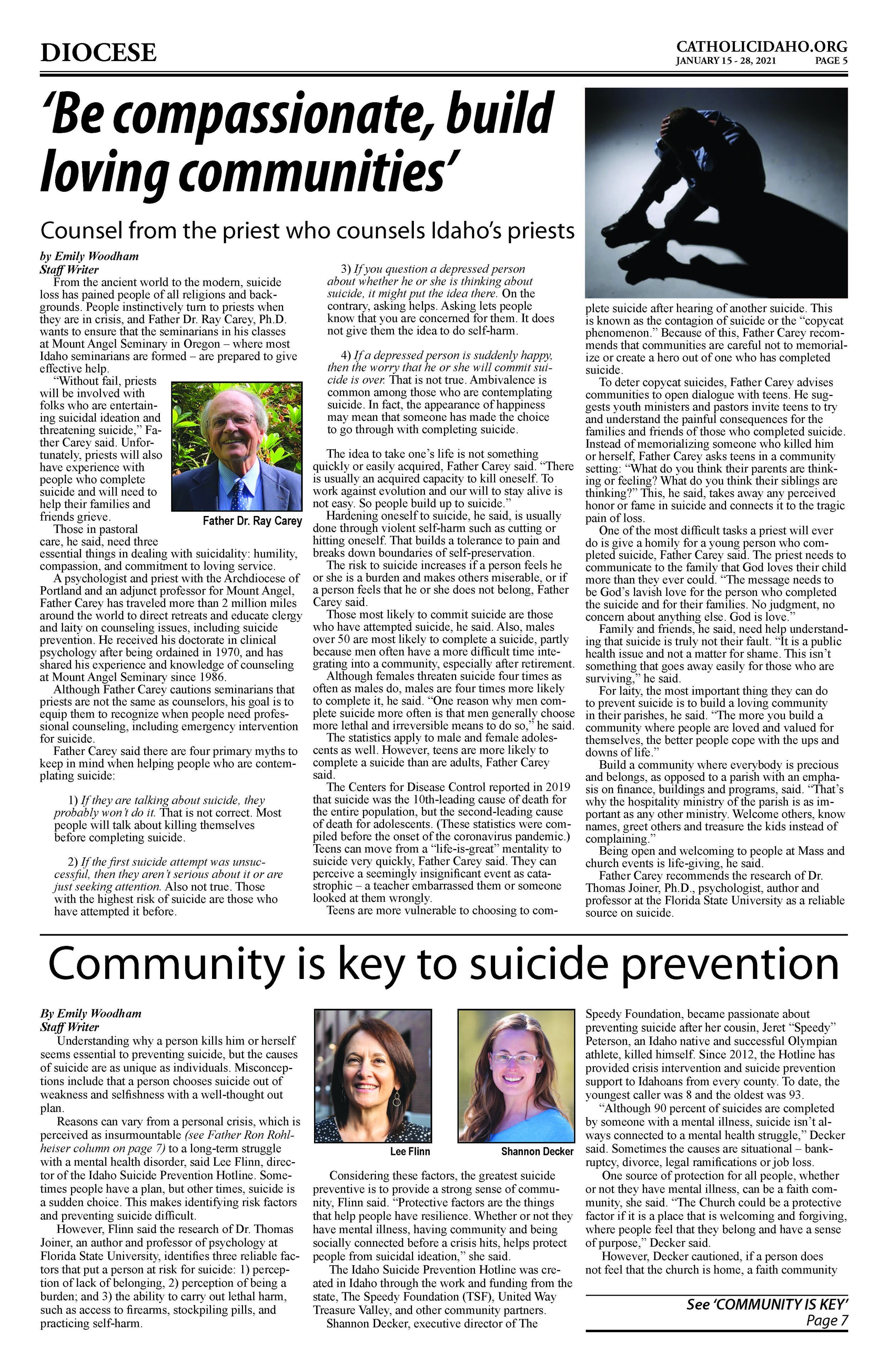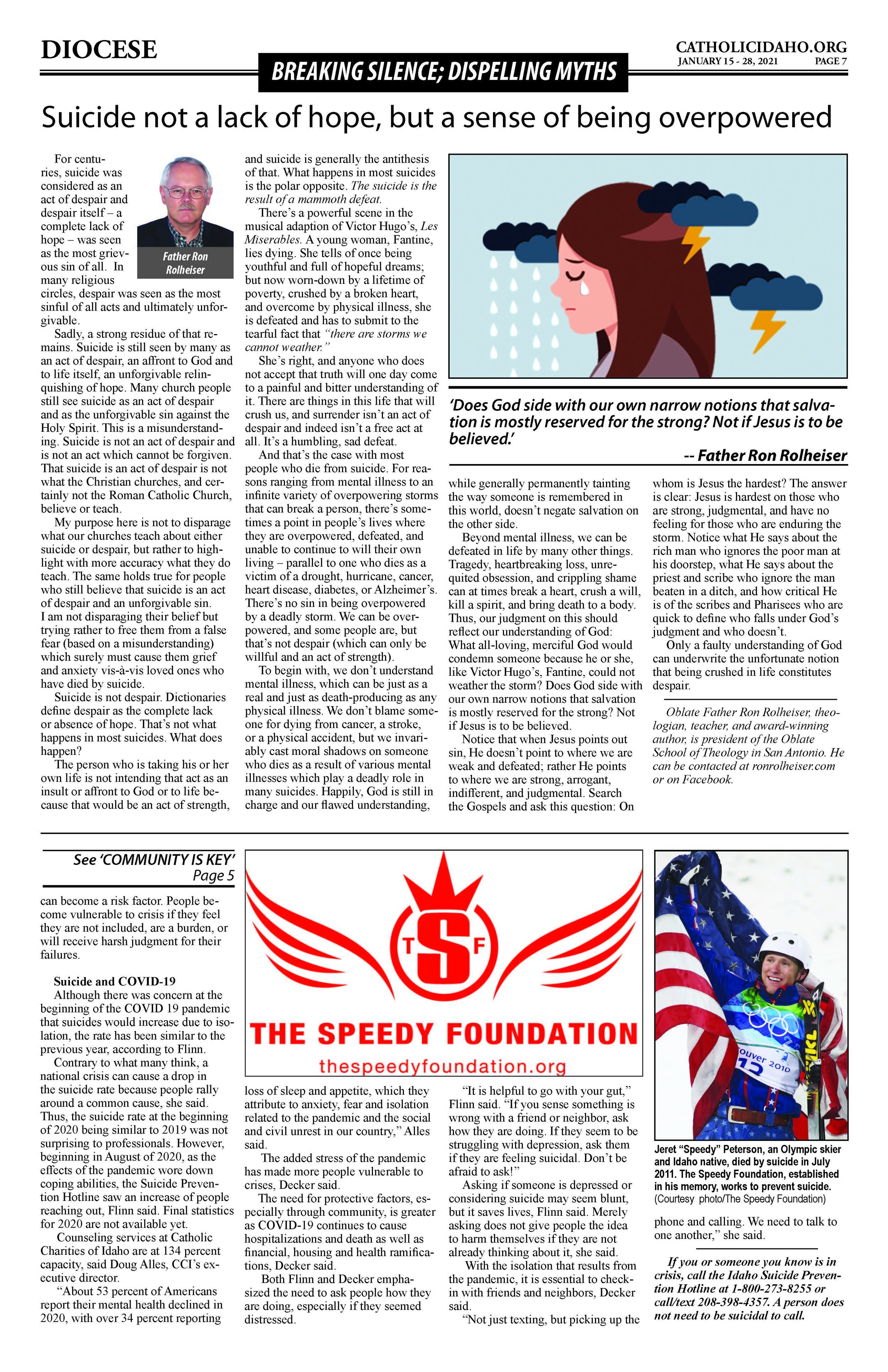Community is Key to Suicide Prevention - Idaho Catholic Register
By Emily Woodham, Staff Writer, Idaho Catholic Register
Understanding why a person kills him or herself seems essential to preventing suicide, but the causes of suicide are as unique as individuals. Misconceptions include that a person chooses suicide out of weakness and selfishness with a well-thought-out plan.
Reasons can vary from a personal crisis, which is perceived as insurmountable (see Father Ron Rohlheiser's column on page 7) to a long-term struggle with a mental health disorder, said Lee Flinn, director of the Idaho Suicide Prevention Hotline. Sometimes people have a plan, but other times, suicide is a sudden choice. This makes identifying risk factors and preventing suicide difficult.
However, Flinn said the research of Dr. Thomas Joiner, an author and professor of psychology at Florida State University, identifies three reliable factors that put a person at risk for suicide: 1) perception of lack of belonging, 2) perception of being a burden; and 3) the ability to carry out lethal harm, such as access to firearms, stockpiling pills, and practicing self-harm.
Considering these factors, the greatest suicide preventive is to provide a strong sense of community, Flinn said. “Protective factors are the things that help people have resilience. Whether or not they have a mental illness, having community and being socially connected before a crisis hits, helps protect people from suicidal ideation,” she said.
The Idaho Suicide Prevention Hotline was created in Idaho through the work and funding from the state, The Speedy Foundation (TSF), United Way Treasure Valley, and other community partners.
Shannon Decker, executive director of The Speedy Foundation, became passionate about preventing suicide after her cousin, Jeret “Speedy” Peterson, an Idaho native and successful Olympian athlete, killed himself. Since 2012, the Hotline has provided crisis intervention and suicide prevention support to Idahoans from every county. To date, the youngest caller was 8 and the oldest was 93.
“Although 90 percent of suicides are completed by someone with a mental illness, suicide isn’t always connected to a mental health struggle,” Decker said. Sometimes the causes are situational – bankruptcy, divorce, legal ramifications, or job loss.
One source of protection for all people, whether or not they have a mental illness, can be a faith community, she said. “The Church could be a protective factor if it is a place that is welcoming and forgiving, where people feel that they belong and have a sense of purpose,” Decker said.
BREAKING SILENCE; DISPELLING MYTHS
‘Does God side with our own narrow notions that salvation is mostly reserved for the strong? Not if Jesus is to be believed.’
-- Father Ron Rolheiser
However, Decker cautioned, if a person does not feel that the church is home, a faith community can become a risk factor. People become vulnerable to crisis if they feel they are not included, are a burden, or will receive harsh judgment for their failures.
Suicide and COVID-19
Although there was concern at the beginning of the COVID 19 pandemic that suicides would increase due to isolation, the rate has been similar to the previous year, according to Flinn.
Contrary to what many think, a national crisis can cause a drop in the suicide rate because people rally around a common cause, she said. Thus, the suicide rate at the beginning of 2020 being similar to 2019 was not surprising to professionals. However, beginning in August of 2020, as the effects of the pandemic wore down coping abilities, the Suicide Prevention Hotline saw an increase of people reaching out, Flinn said. Final statistics for 2020 are not available yet.
Counseling services at Catholic Charities of Idaho are at 134 percent capacity, said Doug Alles, CCI’s executive director.
“About 53 percent of Americans report their mental health declined in 2020, with over 34 percent reporting loss of sleep and appetite, which they attribute to anxiety, fear and isolation related to the pandemic and the social and civil unrest in our country,” Alles said.
The added stress of the pandemic has made more people vulnerable to crises, Decker said.
The need for protective factors, especially through community, is greater as COVID-19 continues to cause hospitalizations and death as well as financial, housing and health ramifications, Decker said.
Both Flinn and Decker emphasized the need to ask people how they are doing, especially if they seemed distressed.
“It is helpful to go with your gut,” Flinn said. “If you sense something is wrong with a friend or neighbor, ask how they are doing. If they seem to be struggling with depression, ask them if they are feeling suicidal. Don’t be afraid to ask!”
Asking if someone is depressed or considering suicide may seem blunt, but it saves lives, Flinn said. Merely asking does not give people the idea to harm themselves if they are not already thinking about it, she said.
With the isolation that results from the pandemic, it is essential to check-in with friends and neighbors, Decker said.
“Not just texting, but picking up the phone and calling. We need to talk to one another,” she said.
If you or someone you know is in crisis, call the Idaho Suicide Prevention Hotline at 1-800-273-8255 or call/text 208-398-4357. A person does not need to be suicidal to call.
Jeret “Speedy” Peterson, an Olympic skier and Idaho native, died by suicide in July 2011. The Speedy Foundation, established in his memory, works to prevent suicide. (Courtesy photo/The Speedy Foundation)


